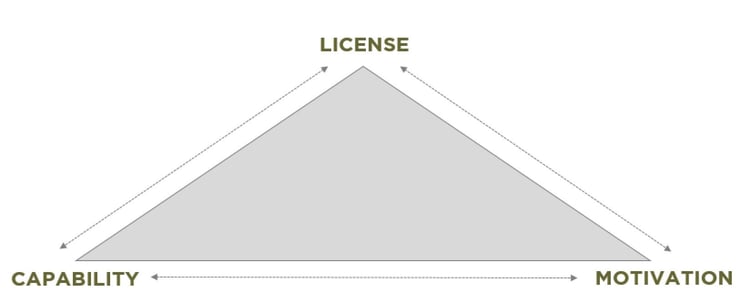During the Edison CEO Summit at HBS, Professor Ryan Buell introduced our team to the concept of the business success triangle (Fig. 1.) which really hit home for our CEOs. In particular, Mark Heinold, CEO of TrialScope, plans to put it at the forefront of his next leadership team meeting -- “we will incorporate the triangle in all that we do related to setting both objectives and expectations in the business.” Understanding what that really means is a key part of the learning that took place with our CEOs, so we’ve asked Mark to elaborate on how he plans to utilize this triangle (capability, motivation, license) in his organization.
Let’s take each point on the triangle one by one:
 Fig. 1. From Professor Ryan Buell's Setting the Conditions for Successful Teams session,
Fig. 1. From Professor Ryan Buell's Setting the Conditions for Successful Teams session,
Edison CEO Summit, Harvard Business School
Capability.
During class discussion, it was suggested that having capability meant having the right people in the right roles, a key factor to effective execution of growth initiatives. Obvious, right? Yes and no. It can be a bit more nuanced than just hiring and hoping your hires are the right people. Managers need to give employees the training and/or the tools to be as effective as possible. For growth-stage companies, it is not uncommon for the needs of the organization to periodically outgrow the capability of the employee for a particular position. If better training and tools cannot drive the necessary capability for his/her current position, then a valued employee’s strengths may be better leveraged elsewhere in the business.
Motivation.
“Finding and motivating people that want to be working in a growth organization where they can continually learn, contribute and exceed expectations will help move our culture and company forward,” according to Mark. It’s not just about paying money for someone to work harder for you; rather, understanding what people value and how to give them the ability to obtain that value, whether it’s respect, prestige, ownership of a project, so that they want to go above and beyond for the company.
Mark and his team have recently launched a program enabling TrialScope employees to spend a day or two on site with their customers to get a better understanding of how they are using their product. This has not only communicated a 'we go above and beyond' message, but also offers transparency to motivate TrialScope employees to take ownership of customer perspective and success, which ties into the next topic...

License.
Giving employees license is all about empowerment. At TrialScope. Mark is focused on “empowering employees to create lasting impressions and remarkable moments for customers.” This is right in line with the HBS case, Trouble at Tessei, where the high-speed train cleaning crew in Japan lacked empowerment, leading to gross inefficiencies and negative work outcomes. Tessei turned to reinvigorate the organization by pushing decision-making down to the front lines, giving the employees license to determine how to become more efficient. Similarly, in the HBS case, Train Whistle in the Tiger Reserve, Oberoi Hotels gave employees license and rewards to go out of their way to make a favorable and memorable impression on guests. These cases are also reminiscent of 2014’s CEO Summit with David Marquet’s Turn the Ship Around, a story of turning followers into leaders on the worst-performing nuclear submarine in the Pacific fleet.
The overarching idea behind the triangle is to help create a framework for both solving problems and to help look into your organization’s ability to deliver on your goals. A focus on driving excellence in each of the three points of the triangle will help your employees thrive and the business grow. Mark is one CEO who will be using the triangle, the associated vernacular and above principles in day-to-day business at TrialScope.
How does your organization think about empowering your employees to do the best they can for your customers and your business?

